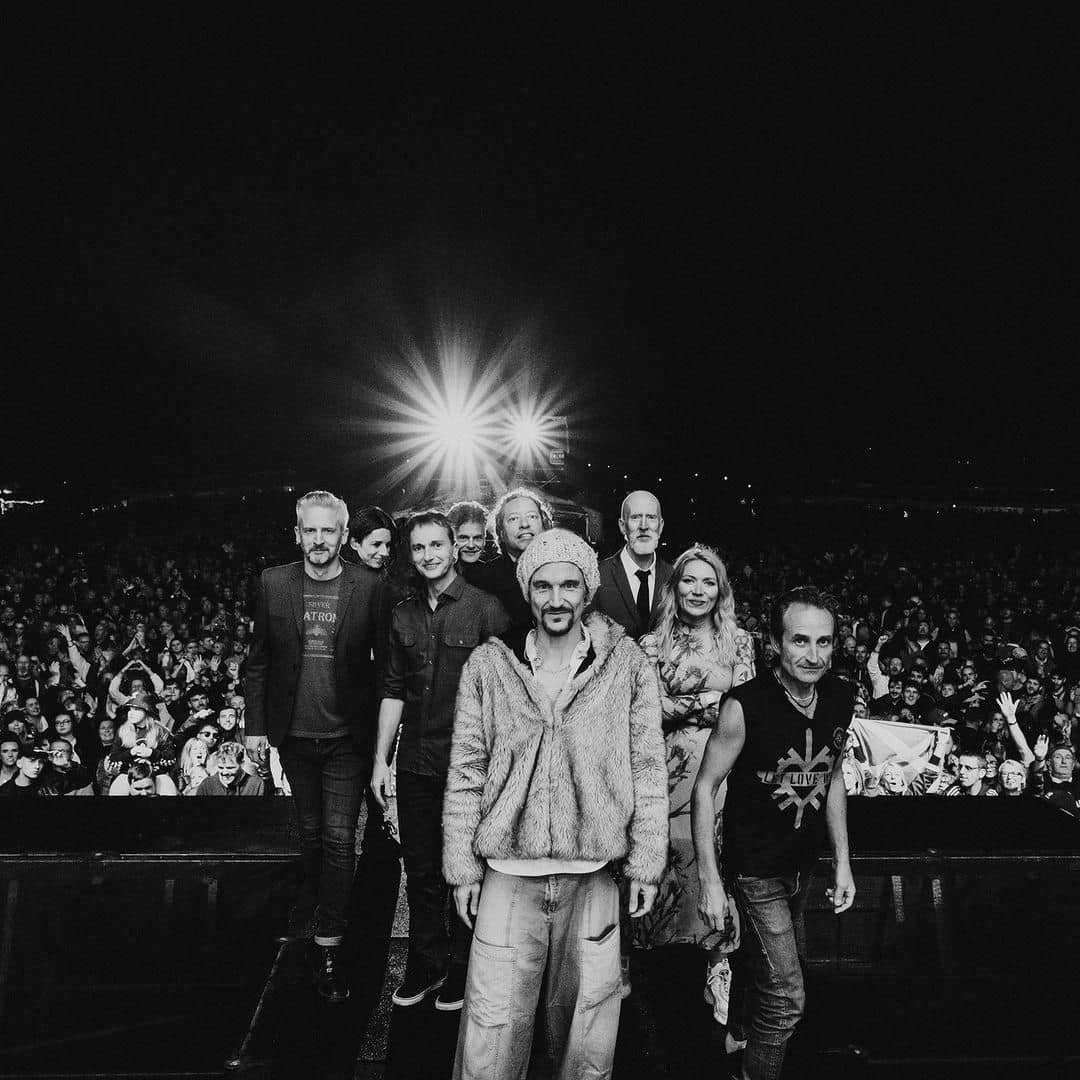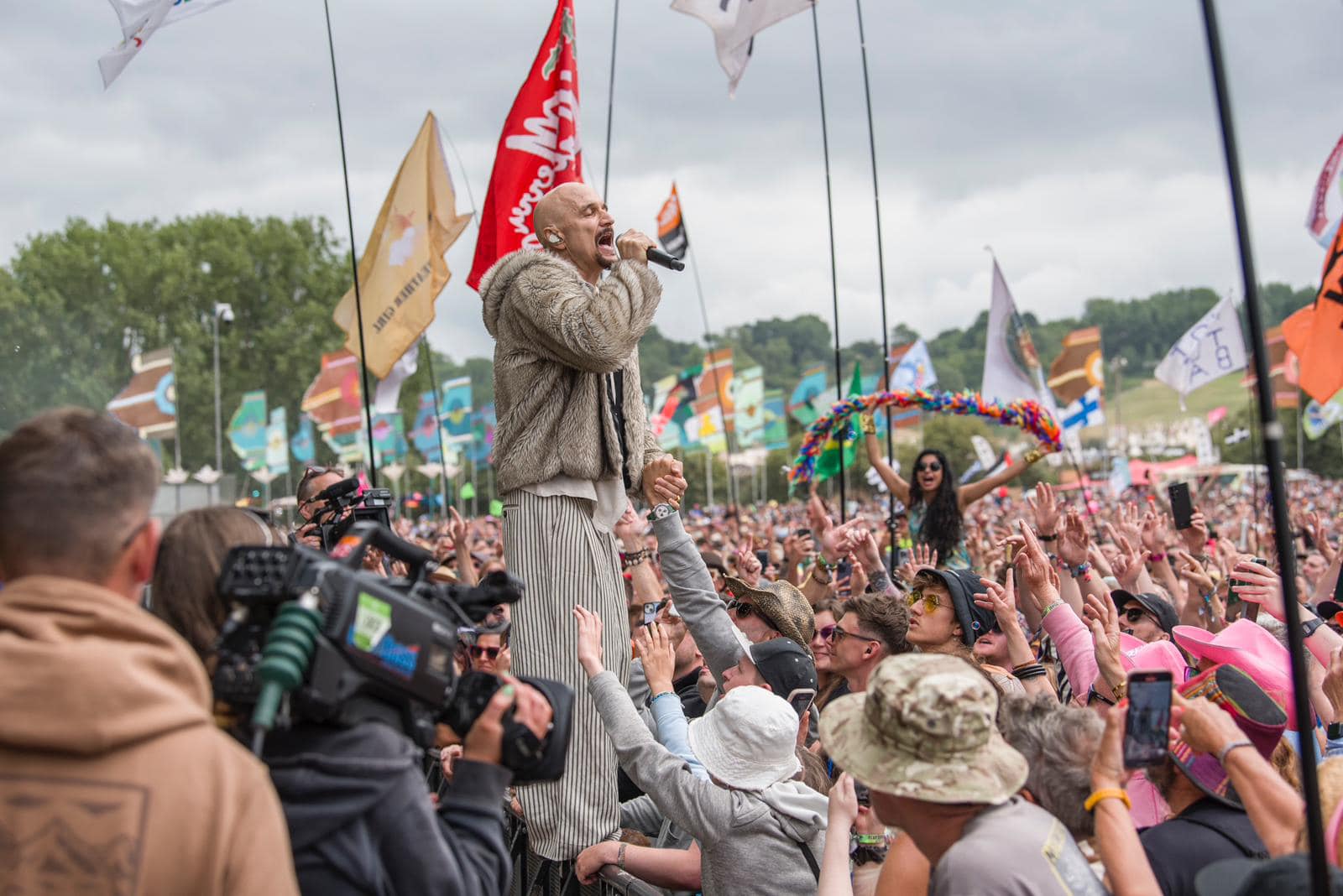Mancunian band James are in the midst of something of a second coming. Always enthralling and consistently against the grain, the band are still best known for early ’90s smashes ‘Sit Down’ and ‘Laid’, but also for frontman Tim Booth’s staccato dancing, and a tendency to veer off into unconventional subject matter.
In Booth they have a captivating frontman, a character who seems at ease with his place in the world – grateful for a reality that’s allowed him to explore himself and express himself so freely. His music, it’s clear, resonates deeply within his very identity. Most recently, 18th studio album ‘Yummy’ has found widespread acclaim, with the band expanded to a nine-piece and containing a newly-feminine element that clearly sits well with Booth.
Fresh from performing Glastonbury with Covid – “something else takes over, I had a few things to give me a little boost. Some of my better gigs have been sick” – Tim Booth caught up with us ahead of playing Collins Barracks as part of Wider Than Pictures.

“It’s hard to judge playing gigs at 3 on a Sunday afternoon,” he says, recalling the festival slot. “They’d all peaked the night before. It was a hard one to call, whether they wanted to be risen again or chilled out. Being sick, I hadn’t really picked up on the vibe, but the other members of the band said ‘pick them up’. So we went for less songs from ‘Yummy’, and went more for hitting the audience on the head.”
“It’s a small, simplistic thing, but to me every gig is about communication. If you’re talking to a stranger about Palestine, for example, you have to judge how to have that conversation the most efficient or effective way. The same with the Irish issues that took place in the 90s. If you want to be understood, you adapt to the person you’re speaking to. Otherwise you’re sloganising.”
“That’s how we see setlists. There’s no good or bad audience, you just have to adapt the conversation. It can be a problem. Anyone who comes to a James gig is going to be disappointed, because generally they’ll have favourite songs that don’t get played. We have something like 400 songs. A lot of hardcore James fans don’t want to hear ‘Sit Down’. They don’t want to hear hits.”
“They want to hear a song they haven’t heard from an album six albums ago, like ‘Bubbles’, or ‘Zero’, or ‘Gaudi’. Songs that are James fans favourites. The duet we did with Sinead [O’Connor ‘I Defeat’], which ended up being a B-side.”
“James were financially suicidal in many of the choices that we made. We made choices that we felt were artistic, or in some cases dumb, young choices breastfed on the NME bullshit of ‘success is bad for you’. The equation in my day was that you shouldn’t become too successful, because success is shit.”
“We’re playing Dublin on a Monday night. The setlist will have ‘either/or’ written on it, as you can never quite tell, especially if you haven’t been to a country for a long time, if people will go ‘fuck Monday’, and just want to celebrate. We’ll go on a journey. We always look at the setlist we played last time and try to change things up.”
“The gig will be a massive celebration because we love coming to Ireland,” he continues. “We’ve never quite understood why we don’t have a bigger audience in Ireland, like in Scotland, which means we don’t come as often.”
“The gig will be a massive celebration because we love coming to Ireland, We’ve never quite understood why we don’t have a bigger audience in Ireland..."
Even after all these years, Booth has a tendency to outline the good and the bad in all James’ success. He shines a light on the mistakes, but also on how they kind of worked out in the end. He and the band have, after all, made the progress they’ve made through a series of sometimes less-obvious choices.
“I try not to be too rose-tinted spectacles about the band, so I’ll give all the sides,” Booth says. “A positive one is that we’ve had a long career and people trust us to make musical choices over business choices. We own ‘Sit Down’, for example, and we didn’t have it on [perhaps their most iconic record] ‘Gold Mother’. The record company came along and told us to put ‘Sit Down’ on ‘Gold Mother’ after it was a huge success and we’d sell a quarter of a million more copies.”
“We had a huge row with them, we didn’t want to do it. We said if they did it, we’d fight them tooth and nail. What we ended up agreeing was that they could do it, but that anyone who bought the original ‘Gold Mother’ would be allowed to take it back to the record store and swap it for the one with ‘Sit Down’ on. No band has ever got that from a major record label, but they agreed to it, and it made us respect them. Our relationship was much better after that. We were less afraid of the big bad wolf, so it was a win-win.”
“Of course, nobody took the record back. They all wanted the songs that were on the original ‘Gold Mother’ that had to make room for ‘Sit Down’. The original has a song called ‘Crescendo’ on it that made way for ‘Sit Down’. That’s now a real fan favourite.”

Another feature of the iconic ‘Gold Mother’ album was Booth’s decision to write about the UK government’s attitude towards Northern Ireland, more specifically, the investigation into whether the army had a ‘shoot to kill’ policy. Booth’s sympathy for the Republican cause is something that very much went against British convention at the time. It resulted in ‘Government Walls’ an anti-government and British army leadership anthem, if you will, rooted in a sense of justice from a Manchester band.
“We lived in Manchester, of course, and John Stalker [who investigated ‘Shoot To Kill’] was from Manchester. He was the chief of police, and he came across as a real honest cop. When he said there was a shoot to kill policy, after being sent to investigate, he was discredited by the media,” Booth says. “You could tell he was a genuine guy, looking to honestly discover the truth. When he said there was such a policy, he was just discredited and it drove us mad. Injustice is injustice, it shouldn’t matter which side you are on”.
“We wrote a song more recently about conspiracy theories. Everyone seems to have their own that they believe in, even if they think most of them are complete bollocks. Things like ‘shoot to kill’ showed that governments don’t represent us, really. It’s about power. The judicial system is the same. I’m not a political lyricist generally, but sometimes a sense of injustice makes me furious, and then I have to write about it.”
“That song was on ‘Gold Mother’, and that was when I started, I think, to really speak my truth. Before that I was more mythological. There was another song on the record, ‘Mother Courage’, about childbirth. I don’t know how many white boys were writing songs about childbirth back then, but I’m glad I was. When two women joined our band later, they told me that writing that in the 90s made it a feminist anthem. I felt really proud.”
Being a bit ‘out there’ for whatever era they play in has been a feature throughout James’ career, though broadly speaking, society has moved back towards them, with their decisions rooted in taking different perspectives and going against prevailing narratives they considered to be wrong.
“the equation in my day was you shouldn’t become too successful, because success is shit”
“In the 90s,” Booth recalls, “I would choose these strange topics to sing about. They’re no longer seen as strange. We were straight boys in dresses. The homophobia we witnessed caused our reaction.”
“There was one particular amazing tour, Lollapalooza. We were basically playing to an audience there to see Tool, Korn, Snoop Dogg, The Prodigy… they hated it. We’d walk on and they’d scream ‘faggots’ at us.”
“We were wearing fairly generic clothes. So After two gigs I went out and bought us sequined tops, sequined dresses. We thought we’d take them on. For the whole of that tour, we wore a mixture of very camp clothes. I’d go out into the audience in my sparkly lilac mirrorball shirt, cowboy hat, and at the time I had a ruptured disc in my neck. I thought they might hit me. They didn’t.”
“I’d go and sit in their laps, sing to them, but I’d do it with no anger. I sang from an honest place. It was incredible. In fact, I was offered drinks, drugs… anything to get rid of me, I think, but nobody tried to hurt me.”
The offer of drugs at the time, of course, was somewhat contrary, as Booth was famously tee-total. The demise of the band for several years in the 00s has been attributed at least in part to the frontman’s frustration with the increasingly chaotic scenes unfolding around him.
“The last seven years I got into psychedelic therapy, which is a change having not really taken anything, not even alcohol, from the age of 21 to 56. So go figure, I’m not the clean boy that I was,” he says. That said, change has always been a part of James, and that gradual but persistent metamorphosis simply feels right to Booth.
“We’re a blessed band, and change just happens. I joined because they saw me dancing in a nightclub,” he laughs. “It was a fateful accident. The rest of the members joining the band has been fairly similar. Larry saw a guy get up at an improv night with a violin, and loved him. He rang us from the club, and said we were having a 10am rehearsal because he was leaving at 12. That’s how Saul joined.”
“Debbie was crazy. We were looking for a second drummer, and I wanted a woman for backing vocals. I auditioned her on Skype. She was ballsy and fun and I immediately liked her. This was Wednesday. James were rehearsing on Friday, and going on tour on Monday. I told her to turn up on Friday to see if she fits in. She did. This 25 year old was meant to be in the band. So she packed her bags and came on tour. There was this kind of ‘absolute knowing’ that this was going to be for a while, which was quite something.”
“And then she brought in her girlfriend Chloe, and it felt the same. So we became a nine piece. They’ve changed, and it is magnificent, and we’ve made room for them. We want everyone to shine, to show off, to show what a glorious human being they are. You can hear them all over the new record, taking James into a new era.”
“Chloe has this incredible vocal. Like if Kate Bush did backing vocals. They’re remarkable. The women have walked into a band of 35 years standing and just planted their flag, and I admire them so much for it.”
For all their success, ‘Yummy’, James’ most recent record, released earlier this year, was the band’s first number one, a remarkable twist after such a long period, given their monstrously successful series of singles around the turn of the 90s.
“With ‘Yummy’, we went for it.” Booth says. “The number one was never really on our wishlist – Santa didn’t receive a letter. But we had the changeover from an old manager we had for 35 years, and a new young manager. The new young manager said he thought we could get the record to number one.”
“We decided to put out a few things on social media and so on, and we were slightly surprised it worked. We did a few extra little things. It doesn’t mean all that much to us, to be honest. Music isn’t a competition, nobody is supposed to lose. But I’m happy with what we have. It’s not football.”
"Injustice is injustice, it shouldn’t matter which side you are on”.
Football, by the by, is something Booth loves, and has indirectly influenced his music.
“I’m a Leeds fan for my sins, and one of my early memories is as a 7-year-old walking into Elland Road and hearing men singing,” he says. “Real foul mouthed anglo-saxon reactionary stuff. Not hymns. That was a revolution for me, the reason I started liking it. It hits something nothing else in the culture hits.”
There’s also the therapeutic side. “If I sat down and wrote a healing song, I think it’d be a bit bollocks. But I do think it’s in me. I think I became a singer unconsciously when I heard Patti Smith’s ‘Birdland’ when I was 16. I got a call telling me my father was going to die. So I was sat in this Victorian imperial public school, that felt a bit like a prison camp. I was told the news, and I was there broken down crying at 11 o’clock at night. I couldn’t sleep, obviously.”
“I went to a study and put on an album that I really hadn’t heard, and the third song was about a father dying and leaving a boy alone on a New England farm. He was left there with the black funeral car pulling away, and it was as if someone had spread butter on the fine point of all the stars. A nine minute song about a boy losing his father both devastated and led me from the place I was in, which was desperately lonely and unhappy. I literally sold all my records the following week and told myself that if I wasn’t able to find anything as strong as that, I wasn’t going to have music.”
“For about six months I only had ‘Horses’ and Lou Reed’s ‘Berlin’, a really depressing album. Then punk came along and I thought that was close if less poetic, and I lowered my standards, became a punk, saw The Clash eight times, all that kind of stuff.”
“Patti and Iggy were the two reasons I was singing. Iggy would go in the audience and it was dangerous. I wanted to go into the audience, but I wanted to look in their eyes and love. The love bit has become a bit more obvious in recent years. Having the two women in the band has made James more overtly about love, but it was always there.”
“We did carry some of the tortured artists with us. I find the lyrics often tell me, when we’re jamming, what they want to be about. I just follow the lyric, and stay true to it. Sometimes it feels like things have already been written, and I need to get my ego out of the way. I have a proper big ego that wants to quash anything. My ego pretends it’s not there, but it is. Ego can be quiet and shy; the thing that makes you a wallflower. It’s anything that gets in the way of being authentic and spontaneous.”
Booth, he might even argue himself, is simply getting out of his own way. “I’m just trying to love, understand, and meet,” he says. “But it’s all ego except breath.”
James play Collin’s Barracks as part of Wider Than Pictures, with support from The Zutons, on August 26th. Tickets are on sale here.
